|
|
|
Sort Order |
|
|
|
Items / Page
|
|
|
|
|
|
|
| Srl | Item |
| 1 |
ID:
171814
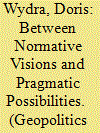

|
|
|
|
|
| Summary/Abstract |
During the last decades the map of Europe has changed considerably. New claims for independent statehood were brought forward and demanded for recognition. These claims had to be answered by the European Union and its member states. This article evolves around the idea that state recognition is as much a matter of politics as it is of law. It starts from the assumption that ‘who we are defines what we see’, claiming, that EUropean identity, the images the EU and the member states hold about themselves, shape the mental maps they hold of territories and space. Building on this identity a geopolitical imaginary is formed, which can be defined as ideas, allowing actors to ascribe meaning to territories, establish order in a seemingly chaotic world by means of classification and categorisation and allow to develop strategies for action. The geopolitical imaginary of EUrope contains the vision, that if all states were more like EUrope itself, the world would be a better place: a world determined not by power and coercion, but by rules, norms and values; with conflict mechanisms, not based on the rule of the strongest, but the rule of law; stability, created through common rules, negotiation and economic prosperity; and a determination not to let ‘blunt power-politics’ prevail. This imaginary shapes the way in which Europe makes meaning of claims for statehood and decides which claims to recognise as legitimate. The different elements of the imaginary sometimes contradict each other: law may have to take the back seat in the quest for stability or justice. Law is open to creative interpretations to allow the ‘right’ claims for recognition to prevail and the ‘wrong’ ones to be rejected The tool of recognition is caught between legal arguments and political considerations, between normative visions and pragmatic possibilities.
|
|
|
|
|
|
|
|
|
|
|
|
|
|
|
|
| 2 |
ID:
160771
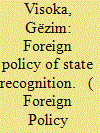

|
|
|
|
|
| Summary/Abstract |
This article explores the policies and activities undertaken by Kosovo as it seeks diplomatic recognition under conditions of contested statehood and transitional international order. Existing debates about diplomatic recognition—in particular, how independent sovereign statehood is achieved—generally rest upon systemic factors, normative institutions, and the preferences of great powers. In contrast, we argue that the experience of Kosovo presents a more complex and less predetermined process of international recognition, in which the agency of fledgling states, diplomatic skill, timing, and even chance may play a far more important role in mobilizing international support for recognition than is generally acknowledged. In building this argument, we explore Kosovo’s path to contested independence and examine the complex process of diplomatic recognition, as well as highlight the hybrid justifications for recognizing Kosovo’s statehood and independence. Without downplaying the importance of systemic factors, this article contributes to a critical rethinking of norms and processes related to state recognition in international affairs, which has implications for a broad range of cases.
|
|
|
|
|
|
|
|
|
|
|
|
|
|
|
|
| 3 |
ID:
138940
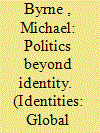

|
|
|
|
|
| Summary/Abstract |
The Northern Irish civil rights movement, like other minority or subaltern struggles, has been interpreted in terms of the national minority’s struggle for state recognition. Such frameworks emphasise the importance of identity in political conflict and tend to assume the state as guarantor of the recognition of identity. The difficulty here is that political possibilities that exceed the terms of identity and the state are obscured. Moreover, the interpretation of the Northern Irish conflict in these terms forms part of the consociational approach to conflict resolution which operates as normative underpinning to the post-conflict state. This article provides an alternative interpretation of the political significance of the civil rights movement. Rather than assuming the analytical usefulness and political significance of identity, I seek to trace the tension between identity and disidentification within the movement, drawing attention to the ways in which activists were aware of, and sought to respond to, the dangers of identity politics.
|
|
|
|
|
|
|
|
|
|
|
|
|
|
|
|
| 4 |
ID:
190856
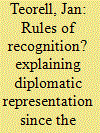

|
|
|
|
|
| Summary/Abstract |
The aim of this article is to explore the establishment of diplomatic representation as a measure of de facto recognition by other state units and to explain its causes in the “long 19th century” (1817–1914) and the post–World War II (WWII) era (1950–2000). Drawing on the Correlates of War diplomatic exchange data, the article explores the underlying drivers of dyadic acts of recognition in two series of logistic regression analyses, one for each time period. The results indicate that, also when taking alternative explanations into account, recognition of other states in the international system was in the 19th century at least based on one general principle: that of recognizing other de facto states. In the post-WWII era, contrary to expectations, this principle was still in effect. De facto statehood can thus be argued to constitute a rather stable norm for recognition in the international system.
|
|
|
|
|
|
|
|
|
|
|
|
|
|
|
|
| 5 |
ID:
185240


|
|
|
|
|
| Summary/Abstract |
This article offers a critical outlook on existing debates on state recognition and proposes future research directions. It argues that existing knowledge on state recognition and the dominant discourses, norms and practices needs to be problematized and freed from power-driven, conservative, positivist and legal interpretations and reoriented in new directions in order to generate more critical, contextual and emancipatory knowledge. The article proposes two major areas for future research on state recognition, which should: (a) expose the politics of knowledge, and positionality, and seek epistemic justice and decolonization of state recognition studies; and (b) study more thoroughly recognitionality techniques encompassing diplomatic discourses, performances and entangled agencies. Accordingly, this article seeks to promote a long overdue debate on the need for re-visioning state recognition in world politics.
|
|
|
|
|
|
|
|
|
|
|
|
|
|
|
|
| 6 |
ID:
178877
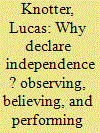

|
|
|
|
|
| Summary/Abstract |
Declarations of independence continue to be commonplace in international affairs, yet their efficacy as means towards statehood remains disputed in traditional international legal and political thinking and conduct. Consequently, recent scholarship on state recognition and emerging statehood suggests that the international persistence of such declarations should be understood in the context of broader international processes, narratives, and assemblages of state creation. Such suggestions, however, risk reifying declarations’ effectiveness more in relation to international structure(s) than to independence movement's own agency. This article, therefore, calls for a reframing of declarations of independence as a ritual in international relations. It argues that participating in the international ritual of independence declaration forms an attempt to ‘fuse’ the movement's political practice with international recognition, serves to express an internal belief in ‘redemption’ through the ‘ascension’ into the ‘celestial’ existence of recognised statehood, and offers an opportunity to internally bolster political community through political performance. Ritual theory, thus, uncovers how the global persistence of independence declarations cannot be explained merely through discrete oppositions of non-recognition versus recognition, belief versus reality, and/or non-state versus state community, and instead opens up new space for understanding the contradictions characterising the international political (in)significance and persistence of statehood declarations.
|
|
|
|
|
|
|
|
|
|
|
|
|
|
|
|
|
|
|
|
|